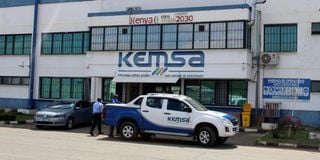Revealed: Kemsa declined offer to save taxpayers Sh1.65bn in PPE deal

Offices of the Kenya Medical Supplies Authority in Nairobi as pictured on December 1, 2020.
What you need to know:
- A parliamentary committee heard how the medical agency rejected an offer from Northlink GSC Ltd Company, which was ready to supply PPE at Sh4,500 instead of the Sh9,000.
- Documents tabled before the committee indicate that there were companies willing to supply PPEs to Kemsa at half the price.
The Kenya Medical Supplies Agency (Kemsa) turned down an offer to buy Personal Protective Equipment (PPE) at half the price in a deal that could have saved taxpayers Sh1.65 billion, lawmakers were told on Thursday.
A parliamentary committee heard how the medical agency rejected an offer from Northlink GSC Ltd Company, which was ready to supply PPE at Sh4,500 instead of the Sh9,000.
Northlink director Ahmed Takoy told the National Assembly Public Investment committee today that he had ready procured PPE from China in April and was ready to supply at Sh4,500, but Kemsa told him to review the prices to Sh9,000.
“I told them that was my price and I was not willing to change,” Mr Takoy told the Abdulswamad Nassir-led committee at Parliament buildings.
“I believe in doing clean business. Many people approached me to do some things but I told them No,” Mr Takoy added.
In his letter of intent sent to Kemsa on April 14, he indicated his willingness to supply 3-surgical masks at Sh90 each, N95 at 900 each and PPEs at Sh4,590 each.
Asked by the lawmakers whether his PPEs were of good quality or lower quality, hence the reason why he was ready to supply at lower prices, Mr Takoy said he got his merchandise from China – the same place where other suppliers also got their goods, hence he did not understand why they were selling theirs at Sh9,000.
Mr Takoy, however, admitted that he got a tender to supply 1.5 million pieces of surgical facemasks at a total cost of Sh130 million.
He told the committee that he has never done business with Kemsa before and that they were engaging for the first time.
According to Mr Takoy, his company was registered in 2008 and has only two directors. The firm mainly deals with civil works, electrical work and general supply of non-pharmaceuticals.
Cheaper options not considered
Documents tabled before the committee indicate that there were companies willing to supply PPE to Kemsa at half the price. However, they were not considered for the multi-billion shilling tenders that have now turned out to be a monumental scandal that is being investigated by the Ethics and Anti-Corruption Commission.
Mvita MP Nassir, who is in charge of the parliamentary team, said that due to limited time of writing their report, the committee will call some of the companies that were willing to supply at lower prices but had their offers rejected by Kemsa.
“All the negotiations that Kemsa purported to have done with the companies are just a scam. It was just meant to sterilise irregularities that they had already done. We will now go through all the companies, find out the rates they were willing to supply and why they were locked out by Kemsa,” Mr Nassir said.
He added, "Had Kemsa gone for these lower bids that were being offered by these companies, this country would have saved sh1.65 billion. But they decided to go for those offering double prices."
Information currently before the committee indicates that the Kenya Covid fund managed to buy PPE at much lower prices than those by Kemsa. The committee has now written to the Covid fund seeking more information on the prices it purchased its PPE.
Wajir East MP, Rashid Amin, said that it was clear from the onset that Kemsa just wanted to misuse public funds.
“From these deliberations, it now coming out clear that Kemsa wanted to swindle the public of millions of shillings,” Mr Amin said.
Northlink GSC becomes the second company to go public by disclosing that their lower prices were rejected. This comes after a forensic audit by the Office of the Auditor-General tabled in parliament in October last year found that Kemsa officials had also rejected a discount from Ms Gladlab Supplies Limited to supply facemasks at Sh3,183 and instead chose to pay Sh4.500 for the same item.
Auditor-General Nancy Gathungu said suspended Kemsa CEO, Jonah Manjari, ignored the discount offer and instead requested the company to supply the items for Sh4,500 a pack as had allegedly been agreed upon during negotiations between the supplier and the agency’s tender evaluation committee.
Dr Manjari remains suspended alongside directors Eliud Muriithi (Commercial) and Charles Jume (Procurement) while investigations into the Covid-19 procurement saga continue.
No capacity, but won tender anyway
Another company, Meraky Healthcare, also found itself on the spot today after it emerged that it did not have any financial or technical capacity, but ended up getting a tender worth Sh140 million.
Meraky director Wairimu Mbogo could not explain why her company was among those handpicked to supply Kemsa even though it had no documents to show that it is a prequalified company.
"So you just walked into the CEO’s office, presented your papers and without doing any proper background check you got a tender worth Sh140 million? And even got paid within one month while other companies are still waiting for payment?” Wondered Mr Nassir.
Ms Mbogo, 36, insisted that her company did not get any preferential treatment and that no prominent figure pushed for her firm to clinch the deal.
"I believe that we followed the law at that particular time because it was an emergency," Ms Wairimu said.
The committee continues with the probe next week with more companies who bagged tenders worth billions expected to appear.





